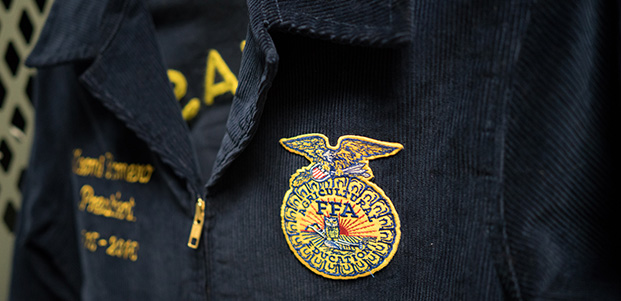The History of the FFA Jacket
Tuesday, October 15, 2019 | Author: Aaron Alejandro, Texas FFA Foundation Executive Director
The FFA Jacket holds incredible opportunity. It harnesses prospects for the day and potential for the future. The jacket has always got it right. The jacket does not ask our ethnicity, religion, sexuality, geography or provide any judgement. It has open arms that welcome students inside and opens a world of incredible opportunity, and it has done so for 86 years.
The FFA jacket is an incredible tool because it levels the playing field. When a student puts the jacket on, they are wearing the brand of an established youth leadership organization while at the same time establishing their own brand for their future. When it is on and zipped up, no one knows the story that is contained inside. They can tell their story. For some, they may come from a broken home, have a family in financial distress, deal with health issues or even insecurities; the jacket provides hope. Others may wear the jacket coming from ideal circumstances and families with stature and resources.

In October 1962, Oran Nunemaker wrote this expert which provides some history on the FFA Jacket:
“How did your jacket come into being? A depression, a new chapter band, an enterprising chapter advisor and an interested jacket manufacturer all had their part in the creation of the jacket which is now worn by thousands and recognized as an official symbol of a Future Farmer of America.
In 1933, general lack of money during the depression and the expense to both the state and national convention influenced V. A. Ross (National FFA Executive Secretary) to accept the offer of J. H. Lintner (advisor of Fredericktown, Ohio) for his chapter band of 30 members to play at the National Convention. Previously only state bands had been invited to perform at the Convention. The boys were excited, of course but they had no uniforms except summer ones consisting of trousers, shirt and cap of blue cotton material with a yellow silk necktie. This was hardly appropriate for the nippy October weather of Kansas City, and the chapter advisor set about to right the situation.

Corduroy jackets were currently "the rage" for high school students, and letters were sent by the chapter to Universal Uniform Company in Van Wert, Ohio who might manufacture some distinctive jackets for an honored band which was to play at the National Convention. Conferences began on whether the emblem might not be embroidered on the back for identification, since the only one available for a pattern was the one engraved on the chapter charter. It was used as a model, however, and a pilot jacket made in the spring of 1933 pleased the members of the chapter. The eagle was not added to the official emblem until a year later, so the original jacket appeared with only the cross section of the ear of corn, the owl, and the plow. National blue was not available from the manufacturer, and navy blue was used.
The popularity of the new jacket caused the chapter members to order them both for general wear and for FFA gatherings. An inquiry to Mr. Ross as to whether the jacket might be added to the official uniform led to the manufacturer's sending a representative to the Convention. After official action was taken, a contract was made which justified ordering the cloth of the national blue. By the time this action had been taken, the eagle had been added to the emblem, which not only increased the cost but presented the problem as to where the lettering which designates the chapter and state should be placed.

Several experimental jackets were made with emblem in back and front with the name under the emblem and the eagle included as part of the insignia with the emblem too low and with the emblem too high. When the jacket was finally adopted, the name of the state appeared over the emblem, the chapter below and as a result of the performance at the National Convention by a local chapter band during depression years a jacket was born!”
|